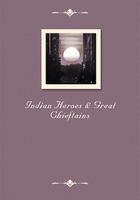
第21章 SITTING BULL(2)
"Follow me!"said Sitting Bull,and charged.He raced his horse to the brim of the ditch and struck at the enemy with his coup-staff,thus compelling him to expose himself to the fire of the others while shooting his assailant.But the Crow merely poked his empty gun into his face and dodged back under cover.Then Sitting Bull stopped;he saw that no one had followed him,and he also perceived that the enemy had no more ammunition left.He rode deliberately up to the barrier and threw his loaded gun over it;then he went back to his party and told them what he thought of them.
"Now,"said he,"I have armed him,for I will not see a brave man killed unarmed.I will strike him again with my coup-staff to count the first feather;who will count the second?"Again he led the charge,and this time they all followed him.
Sitting Bull was severely wounded by his own gun in the hands of the enemy,who was killed by those that came after him.This is a record that so far as I know was never made by any other warrior.
The second incident that made him well known was his taking of a boy captive in battle with the Assiniboines.He saved this boy's life and adopted him as his brother.Hohay,as he was called,was devoted to Sitting Bull and helped much in later years to spread his fame.Sitting Bull was a born diplomat,a ready speaker,and in middle life he ceased to go upon the warpath,to become the councilor of his people.From this time on,this man represented him in all important battles,and upon every brave deed done was wont to exclaim aloud:
"I,Sitting Bull's boy,do this in his name!"He had a nephew,now living,who resembles him strongly,and who also represented him personally upon the field;and so far as there is any remnant left of his immediate band,they look upon this man One Bull as their chief.
When Sitting Bull was a boy,there was no thought of trouble with the whites.He was acquainted with many of the early traders,Picotte,Choteau,Primeau,Larpenteur,and others,and liked them,as did most of his people in those days.All the early records show this friendly attitude of the Sioux,and the great fur companies for a century and a half depended upon them for the bulk of their trade.It was not until the middle of the last century that they woke up all of a sudden to the danger threatening their very existence.Yet at that time many of the old chiefs had been already depraved by the whisky and other vices of the whites,and in the vicinity of the forts and trading posts at Sioux City,Saint Paul,and Cheyenne,there was general demoralization.The drunkards and hangers-on were ready to sell almost anything they had for the favor of the trader.The better and stronger element held aloof.They would not have anything of the white man except his hatchet,gun,and knife.They utterly refused to cede their lands;and as for the rest,they were willing to let him alone as long as he did not interfere with their life and customs,which was not long.
It was not,however,the Unkpapa band of Sioux,Sitting Bull's band,which first took up arms against the whites;and this was not because they had come less in contact with them,for they dwelt on the Missouri River,the natural highway of trade.As early as 1854,the Ogallalas and Brules had trouble with the soldiers near Fort Laramie;and again in 1857Inkpaduta massacred several families of settlers at Spirit Lake,Iowa.Finally,in 1869,the Minnesota Sioux,goaded by many wrongs,arose and murdered many of the settlers,afterward fleeing into the country of the Unkpapas and appealing to them for help,urging that all Indians should make common cause against the invader.This brought Sitting Bull face to face with a question which was not yet fully matured in his own mind;but having satisfied himself of the justice of their cause,he joined forces with the renegades during the summer of 1863,and from this time on he was an acknowledged leader.
In 1865and 1866he met the Canadian half-breed,Louis Riel,instigator of two rebellions,who had come across the line for safety;and in fact at this time he harbored a number of outlaws and fugitives from justice.His conversations with these,especially with the French mixed-bloods,who inflamed his prejudices against the Americans,all had their influence in making of the wily Sioux a determined enemy to the white man.While among his own people he was always affable and genial,he became boastful and domineering in his dealings with the hated race.He once remarked that "if we wish to make any impression upon the pale-face,it is necessary to put on his mask."Sitting Bull joined in the attack on Fort Phil Kearny and in the subsequent hostilities;but he accepted in good faith the treaty of 1868,and soon after it was signed he visited Washington with Red Cloud and Spotted Tail,on which occasion the three distinguished chiefs attracted much attention and were entertained at dinner by President Grant and other notables.He considered that the life of the white man as he saw it was no life for his people,but hoped by close adherence to the terms of this treaty to preserve the Big Horn and Black Hills country for a permanent hunting ground.When gold was discovered and the irrepressible gold seekers made their historic dash across the plains into this forbidden paradise,then his faith in the white man's honor was gone forever,and he took his final and most persistent stand in defense of his nation and home.His bitter and at the same time well-grounded and philosophical dislike of the conquering race is well expressed in a speech made before the purely Indian council before referred to,upon the Powder River.I will give it in brief as it has been several times repeated to me by men who were present.